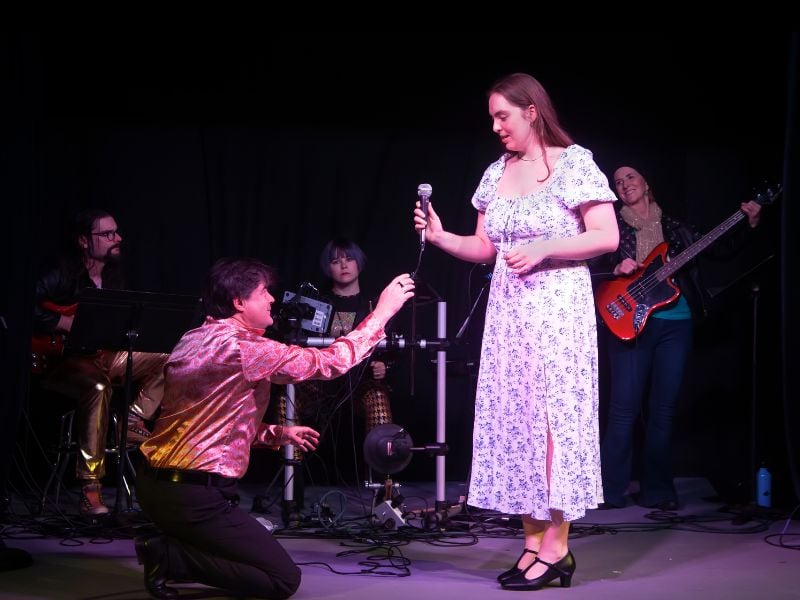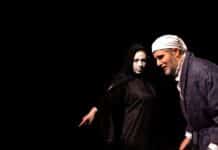Rude Mechanicals’ new adaptation of The Seagull, running through February 1 at Greenbelt Arts Center, is not the first to reimagine Chekhov’s play in modern New York. Emily Mann’s A Seagull in the Hamptons performed at Princeton’s McCarter Theater in 2008, and Thomas Bradshaw’s The Seagull/Woodstock, NY, ran Off-Broadway in 2023. Yet The Rude Mechanicals’ version is unique in its staging of the play as a rock musical. In the words of director Melissa Schick, the Rudes turn The Seagull from “theatre about theatre into a musical about music.”

In the late 1970s/early 1980s setting of the Rudes’ adaptation, the conflict between new and old forms of artistic expression — centered in Chekhov’s original on the turn-of-the-20th-century Russian theater — is deeply believable as the rift between established music industry stars Irina Arkadina (Jaki Demarest) and Boris Trigorin (Steven Howell Wilson) and punk-rock upstart Constantine (originally written as Arkadina’s son, played in this version as her daughter by Marianne Virnelson). The lakeside estate of Arkadina’s brother Peter Sorin (Mikki Barry) is now set in rural New York, and Arkadina and Trigorin sweep into the countryside from Manhattan rather than Moscow, trading Chekhov’s horses and carriages for tour buses, limousines, and cabs. Yet Schick and Liana Olear’s adaptation is remarkable in its simultaneous fidelity to the storyline and dialogue of Chekhov’s original, to its deeply Russian sense of tragicomedy, and to its characters’ loves and longings — aided by a brilliant selection of ’70s and ’80s rock songs that capture the characters’ voices as perfectly as if they had been written for the play.

Masha (Lily Tender) embodies the punk-rock ethos. Dressed throughout the play in black dress, black fishnets, and black boots (Spencer Dye, costume designer), Masha opens the first act, as she does in Chekhov’s original, by announcing that she wears black “in mourning for my life” and telling schoolteacher Medviedenko (Kashaf Jabbar) that “you wouldn’t understand.” Masha serves as a narrator in the Rudes’ adaptation, introducing the other characters with a series of snarky one-liners. As the black curtains at center stage part, revealing a three-piece band cleverly named Chekhov’s Gun (music director Eric Honour on guitar; Diana Dzikiewicz on drums, keys, and violin; and Leah DeLano, who doubles as Masha’s mother Paulina, on bass), Masha sets the stage with a rendition of Siouxsie and the Banshees’ “Happy House”:
We’ve come to play/In the happy house/And waste a day/In the happy house/It never rains, never rains…
We’ve come to scream/In the happy house/We’re in a dream/In the happy house/We’re all quite sane…
Of course, Sorin’s “happy house,” like Siouxsie’s, is far from happy as the cast’s messy, unrequited love triangles, family traumas, and personal and artistic frustrations entangle and bounce off one another as the play progresses.
In this “happy house,” fame becomes nearly a character in its own right — a fickle mistress, an elusive prize, a heavy burden. Clad in sequined jumpsuits, high heels, and a platinum blonde wig, Demarest’s Arkadina is forever chasing the spotlight and the fountain of youth and is constitutionally incapable of playing a supporting role, even in her closest relationships. (In a testament to the actors’ skill and to Stephanie Davis’ touch as intimacy choreographer, both Constantine and Trigorin subtly but noticeably recoil from Arkadina’s physical affections, even as they long for her attention.) Wilson’s Trigorin is jaded by the fame his songwriting has brought him, wearied by always feeling compelled to turn his life into art instead of merely living it, and he admits to being bothered by public criticism of his work. (Listening to Trigorin’s monologue, I couldn’t help but wonder how The Seagull would translate into our 21st-century era of social media influencers, content creators, and online comment sections.) Despite seeing the banality of Arkadina’s and Trigorin’s lives up close during their vacation on Sorin’s estate, Nina (Aisling Mockler), introduced by Masha in Act I as “an aspiring rock star with a 9 p.m. curfew,” desperately wants to run away from her rural hometown and chase fame in the Big Apple. The years — and the pursuit — do not prove kind to her. Mockler’s acting and Dye’s costumes transform Nina from starry-eyed ingenue in floral peasant dresses at the beginning of the play to world-weary woman wandering home in a sparkling draped top better suited to city clubs in the final act. Yet she remains resolute in her commitment to being a singer.
Constantine, by contrast, seems little interested in fame and freely admits that her life would be happier if her mother wasn’t famous. She bitterly accuses her mother and Trigorin of making music that is merely “a vehicle for convention and prejudice!” Constantine could easily be reduced to the caricature of a tortured artist or the petulant child that Arkadina sees her as. Yet Virnelson plays the role with palpable, at times childlike, emotion beneath her prickly exterior and punk-rock aesthetic. Her unfulfilled longing to be seen and understood — not by adoring audiences but by those closest to her — propels the play to its tragic conclusion.
Director Schick shared on opening night that this punk-rock adaptation of The Seagull has been a passion project for her and Olear for years, and it shows in every detail of the production. While occasionally a note falls flat — Trigorin announcing that Constantine has challenged him to a duel, true to Chekhov’s script, feels anachronistic in late ’70s New York — the overall result is a brilliant transposition of a classic work into a fresh and original arrangement.
Running Time: Approximately two hours, including one 15-minute intermission.
The Seagull plays through February 1, 2025, presented by The Rude Mechanicals performing at Greenbelt Arts Center, 123 Centerway, Greenbelt, MD. To purchase tickets ($24, general admission; $22, senior/military; $12, child/student), call (301) 317-7964 or go online.
COVID Safety: Masks are optional.
The Seagull
Directed by Melissa Schick
Adapted by Melissa Schick & Liana Olear
CAST
Masha: Lily Tender
Medvedienko: Kashaf Jabbar
Irina Arkadina: Jaki Demarest
Constantine: Marianne Virnelson
Nina: Aisling Mockler
Boris Trigorin: Steven Howell Wilson
Peter Sorin: Mikki Barry
Eugene Dorn: Joshua Engel
Paulina: Leah DeLano
Shamraeff: Bill Bodie
CREW
Director: Melissa Schick
Assistant Director/Dramaturg/Stage Manager/Producer: Liana Olear
Music Director: Eric Honour
Lighting Design: Jeff Poretsky and Liana Olear
Intimacy Choreographer: Stephanie Davis
Technical Director: Jeff Poretsky
Curtain Engineer: Alan Duda
Window Engineer: Chris Dullnig
Additional Set Construction: Sam Kopel, Jaki Demarest, Nic Adams, Steve Cox, Joshua Engel
Costumes and Props: Spencer Dye
Sound Mixing: Matt Etner
Stage Hand: Sam Kopel
Board Op: Tabi Dickson
Lighting Assistant: Stephen Duda
BAND (Chekhov’s Gun)
Eric Honour: Electric Guitar
Diana Dzikiewicz: Drums, Keys, Violin, Arrangement Assistance
Leah DeLano: Bass
With special guest Matt Etner on Interstitial Music (Vocals and Guitar)



